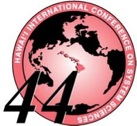Interoperability and Cloud Infrastructure Minitrack

Co-chairs
Yannis Charalabidis (Primary Contact)
Decision Support Systems Laboratory
National Technical University of Athens
Iroon Polytechniou 9,
15773 Zografou, Athens, Greece
Phone: +30-210-7723555
Fax: +30-210-7723550
Email: yannisx@epu.ntua.gr
Marijn Janssen Faculty of Technology, Policy and Management
Delft University of Technology
Jaffalaan 5
NL-2600 GA Delft, The Netherlands
Phone: +31 (15) 2781140
Email: m.f.w.h.a.janssen@tudelft.nl
Olivier Glassey
IDHEAP - Institut de Hautes Etudes en Administration Publique
University of Lausanne
Route de la Maladière 21
CH - 1022 Chavannes-près-Renens/Lausanne, Switzerland
Phone: +41-21-557-4020
Fax: +41-21-557-4009
Email: olivier.glassey@idheap.unil.ch




Information exchange and processing and services provisioning are at the heart of any e-government effort. These efforts require vertical and horizontal interoperability, integration of government operations and cloud infrastructures providing the facilities for creating ICT implementations. All these issues face many technical, organizational, managerial and strategic challenges.
Interoperability is a property referring to the ability of diverse systems and organizations to work together. Infrastructures are public and quasi-public utilities and facilities that are typically used by large numbers of different users, such as the Internet, clouds and libraries. Cloud infrastructures are a new way of providing and using ICT based on the internet and virtualized resources meeting scalability requirements.
This minitrack will provide E-government researchers to exchange theories, methodologies, experience reports, literature and case studies in infrastructures and interoperability. Interoperability research range from the technical to organizational, policy and strategic levels and we solicit for papers covering these aspects. Papers in the field of e-government induced data-and process-based integration, enterprise architecture, cloud computing, ICT-(shared) services, which are also beneficial to practitioners or have a strong relationship with practical problems and case studies, are strongly encouraged. We promote a diversity of research methods to study the challenges of this multifaceted discipline focusing on various aspects of interoperability and also theoretical papers and papers from developing countries.
Topics and research areas include, but are not limited to:
-
-Development, implementation, maintenance of projects, system and enterprise architectures and infrastructures
-
-System, data- and process-based integration
-
-Information reuse, information quality, ontologies and semantic modeling
-
-Cloud computing, ICT-(shared) services, scalability
-
-Software as service, utility computing, platform as service, service providers
-
-Cross-organizational modeling and visualization ranging from the organizational to technical level
-
-Infrastructure, interoperability and enterprise architecture planning, alignment, strategies and governance
-
-Technical, semantic, organizational, managerial aspects of interoperability
-
-Organizational and/or policy perspectives on the dynamics of the infrastructure and interoperability process and barriers to interoperability
-
-Theoretical contributions and contributions from developing countries
-
-Interoperability and architecture standards, principles and frameworks
-
-Service-oriented architectures, web services, semantic web services, web service orchestration and composition
-
-Best practices and case studies at all levels of government, including local and transnational government
-
-Longitudinal studies that span over generations of e-Government implementations
More co-chair information
Yannis Charalabidis is Assistant Professor in the University of Aegean, in the area of eGovernment Information Systems, while also heading eGovernment & eBusiness Research in the Decision Support Systems Laboratory of National Technical University of Athens (NTUA), coordinating policy making, research and pilot application projects for governments and enterprises worldwide. A computer engineer with a PhD in complex information systems, he has been employed for 8 years as an executive director in Singular IT Group, leading software development and company expansion in Eastern Europe. He writes and teaches on eGovernment Information Systems, Interoperability and Standardization, eParticipation and Government Transformation in NTUA and the University of Aegean. He has published more the 100 papers in international journal and conferences. He is Best Paper Award winner of the EGOV 2008 Conference, Best eGovernment Paper Nominee in the 42nd HICSS Conference and 1st Prize Nominee in the 2009 European eGovernment Awards.
Dr. Marijn Janssen is Director of the interdisciplinary Systems Engineering, Policy Analyses and Management Master programme, manages a Toptech executive programme and is an Associate Professor within the Information and Communication Technology section of the Technology, Policy and Management Faculty of Delft University of Technology. He conducted and managed a large number of research projects and published over 150 refereed publications and serves on several editorial boards and conferences in the area of e-government and services engineering. For more information, visit www.tbm.tudelft.nl/marijnj.
Olivier Glassey is assistant professor at the Swiss Graduate School of Public Administration (IDHEAP) where he is in charge of the research and teaching unit "Digital Governance". Within the Swiss Public Administration Network (SPAN), Olivier Glassey teaches public management, quantitative research methods, and management of information systems. His current research topics are public registers' harmonization and data governance of population registers, identity and privacy management, open access and transparency, and more generally eGovernement and eParticipation.

“Information and Technical Infrastructure are Major Elements in Building 21st Century Government”






